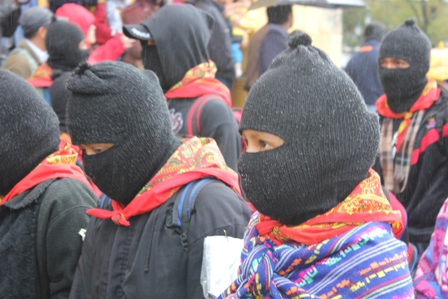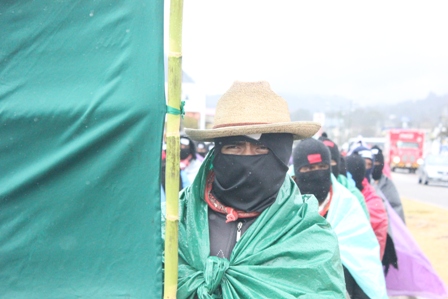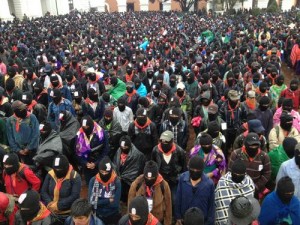Sorry, this entry is only available in Español. For the sake of viewer convenience, the content is shown below in the alternative language. You may click the link to switch the active language.
Veintinueve Años de Resistencia Digna: Un eco en el latido del corazón del pueblo
Del 17 de noviembre 1983 al 17 de noviembre 2012
por el
Grupo de Solidaridad con Chiapas de Dorset
Durante los últimos cinco meses, en muchas partes del mundo se ha estado realizando la campaña internacional en solidaridad con las comunidades bases de apoyo zapatistas más grande de tiempos recientes. Nosotr@s, el Grupo de Solidaridad con Chiapas de Dorset, estamos muy content@s por haber podido aportar nuestro grano de arena, junto con much@s más en 25 países, organizando eventos informativos y acciones, difundiendo noticias e información, y apoyando a la formación de nuevos grupos, conocidos como los “Comités de la Palabra Verdadera,” para respaldar a nuestras hermanas y hermanos zapatistas. En nuestro rinconcito del mundo, hemos logrado alcanzar a personas sin experiencia previa en la lucha, y sabemos que, como resultado de este trabajo colectivo en muchos lugares, muchas más personas ya conocen la historia de l@s Zapatistas. Como dice la Campaña en su primer convocatoria, “Todo el mundo debe de conocer esta historia de dolor, esperanza, e inspiración profunda.”
Comenzó esta historia en Chiapas el 17 de noviembre del 1983 y en el 29 aniversario del natalicio del Ejército Zapatista de Liberación Nacional — lo cual ocurrió en alguna cumbre de alguna montaña en la Selva Lacandona, con tres indígenas y tres mestizos — se clausurará el “Eco Mundial en Apoyo a l@s Zapatistas,” ese proyecto organizativo tan enorme.
Es un aniversario que no solo se celebro en los centenares de comunidades bases de apoyo zapatistas por las montañas, barrancas, y selvas del estado de Chiapas en el sureste mexicano, sino también se observo entre comunidades indígenas al nivel mundial que están luchando porque se reconozcan sus tierras y tradiciones, grupos de todas partes que están luchando en contra del desplazamiento y despojo neoliberal, y todas las personas de buen corazón que trabajan por la democracia, libertad, y justicia. La lucha zapatista ha tocado los corazones y despertado la esperanza en gente de todos los colores y continentes.
Puesto que se acerca el cierre de la campaña “Eco Mundial,” el Grupo de Solidaridad con Chiapas de Dorset ofrecemos los siguientes pensamientos para marcar a donde hemos ido y a donde debemos seguir yendo. En particular, esperamos que esto les sirva a tod@s l@s que participaron en las dos etapas.
La Campaña
El Movimiento por Justicia del Barrio (MJB), es una organización de base comunitaria, compuesta en su mayoría por mujeres migrantes de México, que lucha por dignidad y en contra del desplazamiento neoliberal en El Barrio (este de Harlem) y más allá. Tiene una larga historia de apoyo con otras comunidades y organizaciones que son parte de la Otra Campaña, incluyendo campañas en solidaridad con San Salvador Atenco y San Sebastián Bachajón, y en respuesta a un llamado hecho por l@s BAZ de la comunidad de San Marcos Avilés, quienes están sitiad@s por partidistas con el respaldo del gobierno local, MJB planificó la campaña Eco. Las metas inmediatas de la campaña Eco fueron: “un fin inmediato a la guerra en contra de l@s zapatistas de San Marcos Avilés y liberación inmediata a nuestro compañero zapatista Francisco Sántiz López.”
La campaña arrancó con la difusión del videomensaje de l@s compas de San Marcos Avilés, que relata la pesadilla en la que estaban. Esto resulto en una respuesta enorme. Hasta la fecha, nuestro grupo ha proyectado este video siete veces, con mucho éxito.
Poco después, la guerra que los tres niveles de mal gobierno de México están llevando a cabo en contra de las comunidades BAZ había llegado a otras comunidades, y la campaña, desde luego, creció para brindarles apoyo a todas las comunidades sitiadas–llegando a 6 en octubre. “Nos es sumamente claro,” dice una declaración promovida por la campaña, “que la prolongada represión gubernamental realizada en contra de las BAZ de Comandante Abel, Unión Hidalgo, Guadalupe los Altos, San Marcos Avilés, Moisés Gandhi, y Jechvó, y el encarcelamiento injusto del preso político zapatista, Francisco Sántiz López, provienen de la misma raíz: la ambición y estrategia compartida de los gobiernos municipal, estatal, y federal de aniquilar a los indígenas zapatistas en su guerra de contrainsurgencia.”
Antecedentes
La guerra de atrición del gobierno de México ha permanecido como la estrategia principal de sus esfuerzos de contrainsurgencia desde el 1994, cuando, mediante el “Plan Chiapas 94”, un programa que fue realizado para desplazar a la población indígena, y de esa forma, cortarles su conexión a la tierra. El plan prescribió: “desplazamiento forzado de la población bajo influencia zapatista hacia albergues o zonas de refugio oficiales; neutralización de la diócesis de San Cristóbal; captura de mexicanos identificados con el EZLN; expulsión de extranjeros perniciosos; muerte o control de ganado equino y vacuno; destrucción de siembras y cosechas, y empleo de la ‘autodefensa civil’ (para) romper la relación de apoyo que existe entre la población y los transgresores de la ley”.
Este plan se está llevando a cabo por medio del uso de grupos paramilitares, o grupos de choque organizados en forma paramilitar, compuestos por partidistas locales, y armados, fundados, formados, y dirigidos por los tres niveles del gobierno mexicano, con el fin de destruir la organización zapatista por completo.
Los grupos paramilitares se basan en una estructura militar, se visten y operan como soldados, y tienen armas que son para el uso exclusivo de las fuerzas armadas. Operan mediante amenazas y actos de hostigamiento cotidianos, con el intento de generar el miedo, la atrición, y el estrés entre la comunidad. La mera meta es provocar un enfrentamiento o desplazar a la comunidad para así quebrar la base del movimiento zapatista: l@s BAZ.
“Les debe dar vergüenza el mal gobierno al decir que sus policías esta para salva guardar el orden y la paz social y que en frente de ellos existen robos, amenazas movimientos de paramilitares y disparos de armas de grueso calibre,” dice la Junta de Buen Gobierno del Caracol V, Roberto Barrios. “Debería decir claro que mando su policía para salva guardar a sus paramilitares para que desalojen, despojen, roben las pertenencias de cosecha de nuestros compañeros bases de apoyo.”
Además de la formación de los grupos paramilitares, la guerra de contrainsurgencia, o la en contra de la población civil, también se manifiesta por medio de medidas tales como la ocupación militar de territorios indígenas por todo el estado de Chiapas, la inyección de dinero mediante programas sociales forzados, la persecución política directa, la fabricación de delitos, y el encarcelamiento de miembros inocentes de las bases de apoyo zapatistas.
Francisco
Uno de éstos es Francisco Sántiz López, del ejido de Banavil. El Centro de Derechos Humanos Fray Bartolomé de Las Casas afirma que las violaciones de los derechos humanos de Francisco incluyen: falta de defensa legal adecuada y de acceso a la justicia, falta de un interprete o defensor legal fluente en su cultura e idioma para ayudarle, violaciones contra el juicio justo, y violaciones del principio de la presunción de inocencia. Por estas razones han entregado una moción por amparo legal para Francisco y han pedido su liberación inmediata, indicando claramente:
“Creemos que el caso de Francisco, es un ejemplo en el que el Estado mexicano utiliza el sistema de procuración y de impartición de justicia para criminalizar a Bases de Apoyo del Ejército Zapatista de Liberación Nacional, como consecuencia de su ejercicio del derecho a la libre determinación y autonomía, con base a los Acuerdo de San Andrés y sus referente nacionales, establecidos en el artículo 2° de la Constitución General de la República en relación con el artículo 1°, así como sus referentes internacionales, siendo estos el Convenio 169 de la OIT y la Declaración de Naciones Unidas de los Derechos de los Pueblos Indígenas.”
La situación actual
Ante el proceso histórico de represión, lo que ha logrado la campaña se trata más que nada de más conocimiento y conciencia. Los culpables represores ya saben que están siendo observados muy de cerca, y que las noticias de sus acciones serán inmediatamente difundidas entre lo que se ha convertido en una red de apoyo de nuev@s y veteran@s activistas, organizadores, y comunidades de varios países. En todas partes del mundo, en países desde Corea hasta Argentina, la gente se ha enterado de la situación. Están mirándola. Miles ya conocen a l@s zapatistas y los ataques que enfrenten–muchas personas sin conocimiento previo–y están creando diferentes maneras de brindar la solidaridad a sus compas en resistencias.
Además, nuestros hermanos y hermanas, l@s zapatistas, saben bien que no están sol@s; que la solidaridad internacional, inspirada por su lucha, les está llegando; que mientras que celebraron sus 29 años del EZLN, firmes en la convicción de que nunca se rendirán, les tienden muchas manos a ellos que están cruzando los océanos del mundo.
En un comunicado reciente, después de los actos de hostigamiento negándoles acceso a su fuente de agua, la Junta de Buen Gobierno declaró: “Queremos dejarles claro a los 3 niveles de malos gobiernos oficiales y a su gente que lo tienen pagado, controlado y manipulado, que no piensen que van a detener con provocaciones, amenazas, agresiones y persecuciones la lucha de los pueblos zapatistas, la lucha de los pueblos originarios de todo México por la construcción de nuestra autonomía, a la libre determinación como pueblos originarios y por la liberación nacional, cueste lo que nos cueste, pase lo que pase, pero vamos a seguir adelante, porque la dignidad, la razón y la justicia está a nuestro lado.”
Apoyo
Puesto que se acerca el cierre de la campaña, acciones y eventos siguen organizándose diariamente, y mensajes de apoyo siguen llegando desde todas partes del mundo, de jóvenes en el País Vasco hasta estudiantes indígenas en Canadá, de las calles de Kolcata, India hasta las montañas de Colombia. Igualmente, un@s de l@s apoyadores/as más conocid@s de la campaña han enviado nuevas declaraciones respaldando la campaña. Aquí les van algunas partes de algunos de los mensajes que nos parecen muy conmovedores:
Hugo Blanco, activista social peruano y editor de Lucha Indígena
“Hay una campaña del sistema regido por el 1% para aplastar esta isla de autogobierno democrático, para que no sirva de ejemplo al mundo de que esto es posible y saludable.
Sus instrumentos son el gobierno de México y el del estado de Chiapas, los partidos políticos, las bandas criminales e inclusive campesinos que desean obtener tierras en forma fácil y protegidos desde arriba.
Es pues obligación e interés propio de todos quienes buscamos un mundo nuevo, de todos quienes queremos una sociedad horizontal y solidaria, de todos quienes comprendemos que el 1% nos está llevando a la extinción de la especie y nos interesa la supervivencia de ella; organizar con mucho empeño e inteligencia colectiva, la defensa de esa isla de libertad y democracia en Chiapas, que nos muestra que construir otro mundo, un mundo donde quepan muchos mundos, es posible.”
Raul Zibechi, pensador, escritor, y activista uruguayo:
“Cientos de familias están siendo sitiadas por grupos paramilitares, con el inocultable objetivo de poner fin a una de las más notables experiencias de poder de los abajo existente en el mundo.
No lo conseguirán. Por la firmeza de las comunidades que sostienen su proyecto de vida desde hace décadas, pese a la represión, la muerte, el hambre y el aislamiento.
No lo conseguirán, porque el zapatismo es semilla que se esparció desde el Ya Basta del 1 de enero de 1994. Porque arraigó en los corazones de millones en la Marcha del Color de la Tierra y se volvió obstinada lucha por la vida con la Otra Campaña.
El zapatismo es indestructible entre los muchos abajos que pelean por seguir siendo, que trabajan todos los días por construir un mundo nuevo y diferente.
Toda la solidaridad con las comunidades sitiadas.
Que todos los corazones palpiten juntos, entonando el apoyo mutuo entre los de abajo, celebrando el hermanamiento de todas las luchas, de todos los mundos otros.”
Dra. Sylvia Marcos, feminista y pensadora-activista Mexicana
“Los pueblos indígenas aparecen demasiadas veces como objeto de “ayuda”, de “desarrollo”, de “educación” y no como lo que son, sujetos de los que se puede aprender y que ya abrieron un nuevo camino que ha iluminado la esperanza bajo tantos cielos de este mundo.
Este camino es hoy una posibilidad viva que se manifiesta en una resistencia pacifica sostenida que los de las ciudades, los mestizos, sólo podemos admirar. ¿Por qué tanto miedo, por parte de los poderes tanto gubernamentales como fácticos? ¿Por qué, entre ellos, esta concertación en la agresión, esta desmedida en la violencia? ¿Por qué?
Sabemos que los paramilitares están armados con la anuencia de los tres niveles del gobierno: federal, estatal municipal. Entonces, las agresiones a las bases de apoyo zapatista plantean una interrogante lacerante…..
¿A que le temen para que desplieguen tanta fuerza destructiva?
¿Cual es el peligro de la propuesta, la resistencia y la supervivencia zapatista para el orden capitalista imperante?
¿Será porque demuestran positivamente que otras formas de vida en justicia y dignidad son posibles? ¿Que las satisfacciones de la vida y la alegría de ser no tienen que regirse por el consumismo y la mercantilización? ¿Que se puede “vivir bien”, como lo aseguran las comunidades andinas en Suramérica, con otras formas de organización, de gobernanza y de producción campesina en las que la mejor forma de vivir no es la acumulación de bienes materiales, sino la solidaridad comunitaria y el compartir lo que hay?”
Gustavo Esteva, muy conocido pensador-activista mexicano
“Los zapatistas nos dieron el zapatismo, que ya no les pertenece.
Recuperaron para nosotros la esperanza, como fuerza social, y nos mostraron el valor de afirmarnos en la dignidad.
El zapatismo es hoy una fuerza que recorre el mundo y lo transforma. Es siempre local y siempre abierto al mundo, a enlazar todas las luchas en coaliciones de descontentos y rebeldes.
Asumir el zapatismo como algo nuestro, como una actitud nueva que nos enlaza en estos tiempos oscuros, no significa olvidarnos de los zapatistas. No sólo siguen siendo fuente de inspiración. Se han convertido en demostración eficaz del sentido de la transformación en que estamos envueltos, de su posibilidad. Por eso son el objeto de ataques continuos que intentan destruirlos o por lo menos sofocarlos, detenerlos. Por eso mismo reclaman nuestra solidaridad.
Una de las posturas más radicales de los zapatistas ha sido sostener que ellos son, simplemente, hombres y mujeres ordinarios y que, por tanto, son rebeldes, inconformes, soñadores. Así subrayan que el zapatismo no es obra de líderes, vanguardias o partidos, sino de la gente común. Es una postura política de enorme importancia que define hasta hoy al zapatismo……
Necesitamos actuar. Debemos expresar continuamente nuestra solidaridad con toda la obra zapatista, pero en particular con las comunidades que en estos días están expuestas a una agresión directa y cada vez más intensa. Necesitamos extender esta campaña que las abraza.”
Siguientes pasos
Tenemos mucha admiración y respeto por el Movimiento por Justicia del Barrio, y nos gustaría agradecerles sus esfuerzos tremendos que han hecho para animar y lanzar nuestra Campaña colectiva. Así es como ell@s dicen: “El gobierno y sus gentes tienen sus estrategias, su violencia, su terror. Pero recordamos aquí que nosotr@s también tenemos una opción ante tanta represión: Tenemos la opción de organizarnos y luchar por la justicia, dignidad, y autonomía.”
Aunque la Campaña Eco está por terminar, no debemos bajar la vigilancia. Las comunidades BAZ enfrentan muchos riesgos y siguen vulnerables a nuevas amenazas, mientras que le entran sus 20 años de resistencia, y sus 30 años desde la fundación del EZLN. Los nuevos Comités de la Palabra Verdadera deben seguir trabajando, caminando la palabra por el mundo en protesta a la represión y en apoyo al otro mundo que necesitamos.
¿Por qué? Quizás sea mejor dejar que nuestro compa Hugo Blanco responda: “La zona zapatista… es ejemplo vivo de que “Otro mundo es posible”… No sólo es posible sino urgente, para mantener la supervivencia de la especie humana.”

 Entrada de los Zapatistas a la plaza central de San Cristobal de las Casas
Entrada de los Zapatistas a la plaza central de San Cristobal de las Casas Ejercito Zapatista marchando por las calles de San Cristobal de las Casas
Ejercito Zapatista marchando por las calles de San Cristobal de las Casas EZLN al costado de la catedral
EZLN al costado de la catedral EZLN llegando a la plaza central de San Cristobal de las Casas
EZLN llegando a la plaza central de San Cristobal de las Casas











